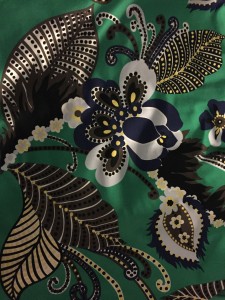February 8, 2016 • Arts Orgs

When I was first drafting my first book, I had a “writing outfit.” I loved wearing it during the writing hours I carved out of my schedule. I loved wearing it on non-writing days to remind me that I had something else in the works, even if I wasn’t actually working on it.
It was the professorial equivalent of what I imagined successful writers wore. It included beautifully tailored long black pants, a blouse with just enough color, and a jet-black cardigan. There were also high heels involved, for obvious reasons.
It made me feel like what I imagined a writer felt like: Professional, but not too professional (certainly no suits), comfortable, but not too comfortable (no pajamas either). Dressing the part made me feel like I actually made sense playing the part, even if my insecurities railed at every turn.
I imagined others could perceive me as a writer. How could they not? In my own mind’s eye, I looked exactly like a successful writer.
The truth is no one cared. No one who saw me hard at work in a coffee shop thought I was a writer. No one who saw me anywhere gave me a second thought. Everyone else was too busy with their own lives, insecurities, tasks, and perceptions to care about my own.
But even if I pretended I was wearing my writer’s outfit so others could identify me as a writer, the truth is I was wearing it so I could. I set high expectations in my own brain, and dutifully my body helped me fulfill them. I looked like a writer, so surely I should be writing. I looked like a successful writer, so surely what I wrote was good. It was useful. It was accomplishing what I wanted it to accomplish.
It started as a trick for my own self; but it didn’t end that way. It ended with fulfillment. I was writing. I was really doing it!
It felt amazing.
I remember that feeling with some regularity, especially when I’d rather wear pajamas all day. Wearing pajamas doesn’t make me feel successful. It certainly doesn’t make me feel professorial. I tell myself I do my best work when I’m not in a stuffy, uncomfortable outfit; but the alternative doesn’t have to be pajamas.
We’ve gotten remarkably good at dressing comfortably. Thank goodness. As corporate environments have relaxed their dress codes, we are no longer required to wear suits or garments that misalign our outsides with our insides. Once upon a time in another lifetime, I relished the chance to wear jeans to work on Fridays, a “privilege” the leaders of the patriarchy were reluctant to bestow on us crazy vagabonds who almost certainly were more concerned with our own well being than the firm’s. And of course, we weren’t permitted to wear jeans every Friday; that would be crazy. On some Fridays under certain circumstances because we were very lucky, we could wear jeans. You’re welcome, they told us.
Now years later, in a slightly different context, I wear jeans regularly and professionally. Neither my work nor my clients’ perceptions of me are hurt. In fact, I suspect they are helped. My outward appearance reflected the work I was trying to do authentically and comfortably. I gave my work the respect it deserved, and I felt good doing it.
There was an article floating around the Internet not too long ago with a few tips for coping with a bad day. “Have you pet something furry?” the article asked. “When is the last time you got a bit of fresh air?” “When did you last exercise?” All valid tips for resetting what otherwise might be a less-than-pleasant day.
But my favorite, by far, was “Are you wearing real pants?”
By dressing for the part—and yes, wearing real pants—we trick our brains and our bodies into exceeding our own expectations. We treat our activities each day with the respect they deserve. Whatever we’re doing deserves real pants.
Painting in the studio requires real pants, and certainly some precautions to protect our garments. Rehearsing a piece requires comfortable garments, and yes, real pants. Editing our own work requires a professionalism and respect for the process we might otherwise minimize. Updating our websites and CVs, checking our bank balances, revisiting our record-keeping systems, and even building our budgets are all vital tasks to running a successful business.
They deserve real pants.
“Real pants” don’t have to be tailored, uncomfortable pants associated with a formality that doesn’t work with our industries. But it should be something more than pajama pants. And perhaps by matching our outward appearance with the professionalism those tasks demand, we’ll be more apt to finish them quickly. We’ll complete them well. We’ll give them the attention they deserve.
And the sooner we do that, the sooner we can get back to our pajamas.


